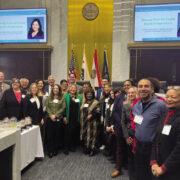“AT times, not only are we hard on ourselves,” I told a group of friends, “We also treat others harder than Jesus would do to them.” They kept quiet for a while, thinking about what I just said. Then it brought about a discussion on self-righteousness and judgmentalism.
Jesus disdains judgmental behaviors and attitudes like in this Sunday’s Gospel. The disciples came to say that they saw someone driving out demons in his name and admonished him not to do it. Instead of condemning this person, Jesus responded, saying, “Do not prevent him. There is no one who performs a mighty deed in my name who can at the same time speak ill of me.” Here we see Jesus’ open-minded acceptance of all the good works and the good people who are bringing his Kingdom about.
Repeatedly, the Gospels show us that Jesus saw goodness in every person. He was most welcoming, understanding, compassionate, and forgiving. He sat and dined with sinners and tax collectors like Zaccheus and Matthew. He even called some of them to be his disciples. He welcomed strangers, healed their wounds, and offered them himself as the life-giving water. He gave second chances to those who denied and betrayed him, taught his disciples to forgive seventy times seven. And one of his last actions before dying on the cross was to offer salvation to the repentant thief.
Still, why are we, Christians, often harsh and judgmental to one another and others? Why do we rift each other apart with disparaging words? We claim ourselves Christians but manifest hateful attitudes, especially toward those who are different from us.
Pope Francis sees this as an evil force destroying the moral fabric of our society. In his message for the 50th World Communications Day, he said:
“Our words and actions should be such as to help us all escape the vicious circles of condemnation and vengeance which continue to ensnare individuals and nations, encouraging expressions and hatred. The words of Christians ought to be a constant encouragement to communion, even in those cases where they must firmly condemn evil, they should never try to rupture relationships and communication.”
The Holy Father does not mean that we should not challenge people in their sinful ways. In his message, he explains:
“We can, and we must judge situations of sin—such as violence, corruption, and exploitation—but we may not judge individuals since only God can see into the depths of their hearts. It is our task to admonish those who err and to denounce the evil and injustice of certain ways of acting, for the sake of setting victims free and raising up those who have fallen.”
But the pope reminds us to challenge people with love. He said that only words spoken with love and accompanied by meekness and mercy can touch our sinful hearts.
In another homily, he also spoke about the importance of gentleness. He said:
“This gentleness is a somewhat forgotten virtue: being gentle, making room for others. There are so many enemies of gentleness, aren’t there? Starting with gossip. When people prefer to tell tales, to gossip about others, to give others a few blows.”
Let’s live up to what it means to be a faithful Christian: loving, caring, welcoming, kind, merciful, gentle, just, and truthful!
* * *
The opinions, beliefs and viewpoints expressed by the author do not necessarily reflect the opinions, beliefs and viewpoints of the Asian Journal, its management, editorial board and staff.
* * *
Fr. Rodel “Odey” Balagtas is the pastor of Incarnation Church in Glendale, California.


